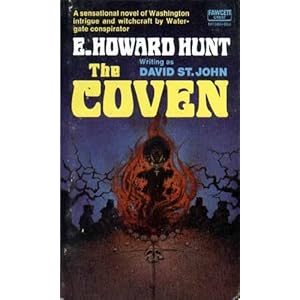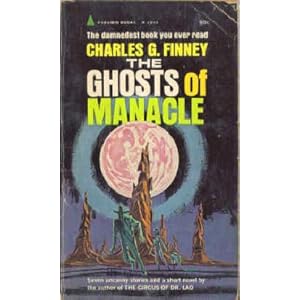Tuesday, August 9, 2011
TIME CAPSULES classic book reviews by Bill Lindblad
THE COVEN by E. Howard Hunt
Bookstore shelves are riddled with bad writing by famous people. Publishers realize that fame alone will entice many people to buy a book, and they take advantage of that fact. The worst abuses are found in the children's book section, but the phenomenon is not exclusive to that area.
The usual workaround is the ghostwriter. A professional writer gets a story kernel from the famous person and produces the book either as billed co-author or with an appreciative nod in the book's dedication. Another is to have the book actually co-authored, allowing the experienced professional to serve as a both editor and teacher to the celebrity.
In very rare instances, the famous person is competent by themselves. Rarer still, they are good. E. Howard Hunt is one of those least common of examples.
Hunt produced the genre-crossing novel The Coven in 1972 under his pseudonym of David St. John. In it, a Washington lawyer works his way through solving multiple murders associated with a charismatic young singer at a Blues club. As he delves more deeply into matters he discovers that a witch's coven is involved, complete with effective magical curses.
His handling of Washington intrigue is believable because it's what Hunt knew from his life. At the time of this book's publication, Hunt was in the national spotlight because of his involvement in the Watergate break-in, for which he eventually served almost three years. He was also rumored to have had information about the Kennedy assassination and the Bay of Pigs invasion. He was one of the most notorious American spies of the twentieth century... and he was a horror writer. A surprisingly good one at that.
Four stars out of five.
THE GHOSTS OF MANACLE by Charles G. Finney
The Weird Western has become a popular subgenre over the past ten years, after a decade of being nearly the exclusive domain of Joe R. Lansdale. Prior to Hisownself, there were occasional stories produced which crossed the horror and western genres, but almost no books.
The Ghosts of Manacle is an exception. Produced in 1964 by Pinnacle, it presents seven short stories and a novella set in the western town of Manacle, Arizona. Unfortunately for any horror lover, it's a book by Charles Finney. That means great writing with hooks that could launch great horror stories, but will instead produce gentler thoughtful fantasies.
The back offers great promise: "Manacle, Arizona is in the heart of the old cowpoke country... but Manacle harbors far stranger creatures than ranchers and rustlers. What about the lady who turns into a dog... and those puritanical flying monsters? And why is it dangerous to do someone a favor in Manacle?"
As mentioned before, the writing is exemplary. I wish only that Finney would have made the most of his horror ideas.
Two out of five stars as a horror book, four out of five as a fantasy.
THE VAMPYRE by John Polidori
This is a short novel from 1819 which was misattributed to Lord Byron for years. The history of its publication makes for interesting reading, as the author was a contemporary and associate of Lord Byron and wrote the story based on a story fragment Byron had developed during the famous writing challenge which spawned Frankenstein. (Polidori was one of the four attendees, the others being Mary Shelly and Percy Bysshe Shelley.) The novel would be considered a novella today, but holds the distinction of being the first vampire story published in English.
In its construction and detail the story is adequate, and while it is dated the fundamental story works fairly well. It follows the dissolution of a well-heeled but innocent protagonist due to his association with a vampire. As with many works of that era, it is as much travelogue as fiction, but it is a successful short piece which has bridged two centuries.
Three stars out of five.
-- William Lindblad



